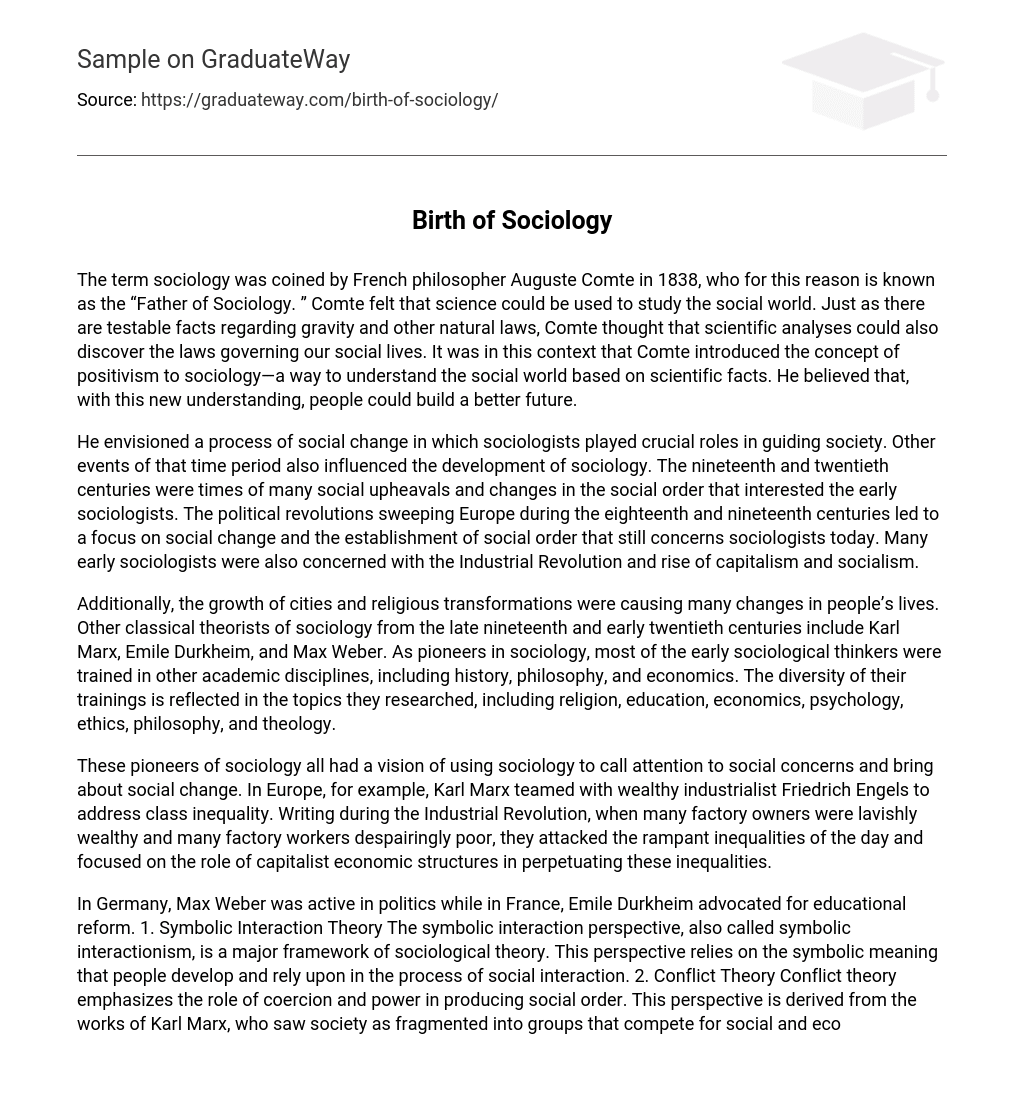The term sociology was coined by French philosopher Auguste Comte in 1838, who for this reason is known as the “Father of Sociology. ” Comte felt that science could be used to study the social world. Just as there are testable facts regarding gravity and other natural laws, Comte thought that scientific analyses could also discover the laws governing our social lives. It was in this context that Comte introduced the concept of positivism to sociology—a way to understand the social world based on scientific facts. He believed that, with this new understanding, people could build a better future.
He envisioned a process of social change in which sociologists played crucial roles in guiding society. Other events of that time period also influenced the development of sociology. The nineteenth and twentieth centuries were times of many social upheavals and changes in the social order that interested the early sociologists. The political revolutions sweeping Europe during the eighteenth and nineteenth centuries led to a focus on social change and the establishment of social order that still concerns sociologists today. Many early sociologists were also concerned with the Industrial Revolution and rise of capitalism and socialism.
Additionally, the growth of cities and religious transformations were causing many changes in people’s lives. Other classical theorists of sociology from the late nineteenth and early twentieth centuries include Karl Marx, Emile Durkheim, and Max Weber. As pioneers in sociology, most of the early sociological thinkers were trained in other academic disciplines, including history, philosophy, and economics. The diversity of their trainings is reflected in the topics they researched, including religion, education, economics, psychology, ethics, philosophy, and theology.
These pioneers of sociology all had a vision of using sociology to call attention to social concerns and bring about social change. In Europe, for example, Karl Marx teamed with wealthy industrialist Friedrich Engels to address class inequality. Writing during the Industrial Revolution, when many factory owners were lavishly wealthy and many factory workers despairingly poor, they attacked the rampant inequalities of the day and focused on the role of capitalist economic structures in perpetuating these inequalities.
In Germany, Max Weber was active in politics while in France, Emile Durkheim advocated for educational reform. 1. Symbolic Interaction Theory The symbolic interaction perspective, also called symbolic interactionism, is a major framework of sociological theory. This perspective relies on the symbolic meaning that people develop and rely upon in the process of social interaction. 2. Conflict Theory Conflict theory emphasizes the role of coercion and power in producing social order. This perspective is derived from the works of Karl Marx, who saw society as fragmented into groups that compete for social and economic resources.
Social order is maintained by domination, with power in the hands of those with the greatest political, economic, and social resources. 3. Functionalist Theory The functionalist perspective, also called functionalism, is one of the major theoretical perspectives in sociology. It has its origins in the works of Emile Durkheim, who was especially interested in how social order is possible or how society remains relatively stable. 4. Feminist Theory Feminist theory is one of the major contemporary sociological theories, which analyzes the status of women and men in society with the purpose of using that knowledge to better women’s lives.
Feminist theory is most concerned with giving a voice to women and highlighting the various ways women have contributed to society. 5. Critical Theory Critical theory is a type of social theory oriented toward critiquing and changing society as a whole, in contrast to traditional theory oriented only to understanding or explaining it. Critical theories aim to dig beneath the surface of social life and uncover the assumptions that keep us from a full and true understanding of how the world works.





